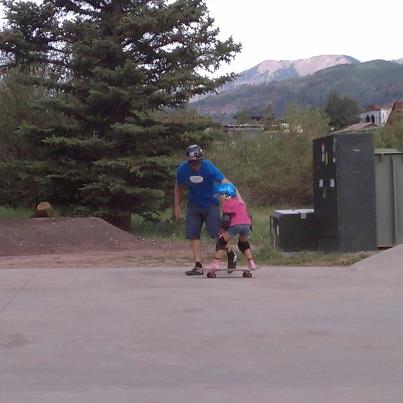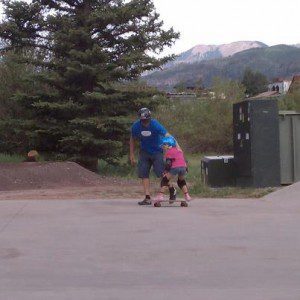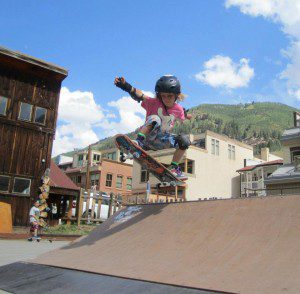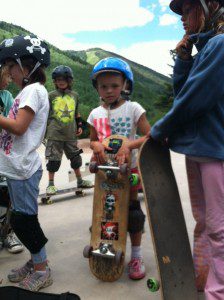
22 Jul SUMMER SUNDAY: LESSONS FROM SKATE CAMP
 Last week I put my 5-½ year old daughter, Mollie, in skateboard camp. I also posted a picture of it on Facebook. All comments and “likes” from the national and international pool of friends, both real and virtual, who make up my FB world proved unequivocally that a 5-½ year old in skate camp was: 1. Rad and 2. Unconventional.
Last week I put my 5-½ year old daughter, Mollie, in skateboard camp. I also posted a picture of it on Facebook. All comments and “likes” from the national and international pool of friends, both real and virtual, who make up my FB world proved unequivocally that a 5-½ year old in skate camp was: 1. Rad and 2. Unconventional.
The comments included the following:
“Something tells me you’re not joking. My kids are at tennis camp and Mollie at skate camp? She’d crush them in a rad contest.”
“Shred.”
“Seriously, skate camp? Let me know when you want to swap kids for the summer. Mine are in swimming/golf/tennis camp, with ballet and lacrosse on the side. They’ll get eaten by a mountain lion the day they set foot out west.”
I’ll let it be known that these comments are from very good friends who are partially kidding and that the kids in Telluride also play lacrosse, golf and tennis, do ballet and swim.
But, from the excitement over Mollie’s very cute, skateboard picture, it did dawn on me that perhaps skateboard camp was not the normal summer camp option (then again, Telluride is not the normal town). And, it begged the question: Why skateboard camp?
It is true, that along with many sports, skateboarding carries with it a few stereotypes – some of them negative. But, just as I would not judge the sport of lacrosse by the negative press around players from powerhouse institutions like Duke University, hockey by the negative behavior of a few Chicago hockey dads and coaches, or football by the despicable acts of one University coach – I would not judge the entire sport of skateboarding and its athletes based on a few unfounded stereotypes.
And, then of course I spoke with Craig Wasserman, Telluride skateboard camp’s founder and coach. There is no other person who I have met who can as convincingly sell the sport of skateboarding to a skeptical mother.
 Wasserman is a teacher, artist, skater and snowboarder who believes, and preaches, that skateboarding teaches dedication, perseverance, respect, skills, balance, strength and coordination.
Wasserman is a teacher, artist, skater and snowboarder who believes, and preaches, that skateboarding teaches dedication, perseverance, respect, skills, balance, strength and coordination.
“You have to respect the sport,” he said, “because it is hard.”
And, I would add, because your landing zone is cement.
“To do it you have to accept being a beginner,” he continued, “and respect people who are better than you. They’re better because they’ve paid their dues.”
In addition to the dedication skateboarding builds in kids, Wasserman loves it because he sees that skateboarding also builds community.
“It’s an individual sport so you have to rely on yourself, but a camaraderie develops on its own in the skate park,” he said. “It happens across ages and genders. They all teach each other tricks and help each other.”
In fact, it was the older kids in his neighborhood in St. Louis, Missouri who took him to his local park and introduced him to the sport when he was growing up.
He also told stories of how skate parks have changed the lives of kids in different areas by exposing them to a physical activity that they are interested in doing and providing a place to do it.
“Look at the Tuba City skate park,” he said of the small city in the Navajo Indian Reservation about 80 miles outside of Flagstaff. “They’ve had it for 5 years and the kids are killing it. It’s changed their lives. It gives them a physical activity and a community.”
Granted, we all think our kids should be doing Algebra and studying a foreign language during the summer, not hanging out in ill-fitting clothes at the skate park. But, given that many parents work during the summer, and kids are often at home unsupervised, perhaps hanging at the skate park isn’t a bad option.
Wasserman is a pretty convincing guy. And in my case, my kids are too young to hang at home unsupervised, and we had done most of the other Telluride summer activities – Ah-Haa Art, Telluride Academy, and swimming — so why not skate camp?
We gave it a try. And as I watched Mollie and the other kids, it was undeniable that Wasserman was correct – they were learning balance, discipline, respect, and coordination. And, skateboarding was, in fact, hard.
And, for the record, the kids under Wasserman’s watch in the skate park were ripping.
 While watching, it also dawned on me that the odds of Mollie seriously pursuing skateboarding at this juncture in her life are pretty slim. We’re pretty busy biking and skiing (and , uh…reading) and her current go-to activities of choice include dressing up in princess costumes, building forts and making sparkly pictures. She has never actually asked me to take her skating.
While watching, it also dawned on me that the odds of Mollie seriously pursuing skateboarding at this juncture in her life are pretty slim. We’re pretty busy biking and skiing (and , uh…reading) and her current go-to activities of choice include dressing up in princess costumes, building forts and making sparkly pictures. She has never actually asked me to take her skating.
Although I’d love to continue to learn with her, if she never picks up a skateboard again I can safely say we got everything we wanted out of skate camp. She practiced her balance and coordination. She had to rely on herself to complete a task, built her self-confidence and interacted with kids of different ages. These are skills she can apply to all sports and life. She also got to look really cool and listen to good tunes while she skated.
But, I must admit, it would be cooler if she did pick up skateboarding. Because, as my friend said on Facebook, she’d “crush it in a rad contest”.
For more information about skate camp in Telluride, check tellurideskatecamp.com.
Summer Sunday is a weekly column by Jesse James McTigue and sponsored by Jagged Edge intended to deliver tips, news, musings and stories about the people, places, events and experiences that make the Telluride summer an epic adventure.


Sorry, the comment form is closed at this time.